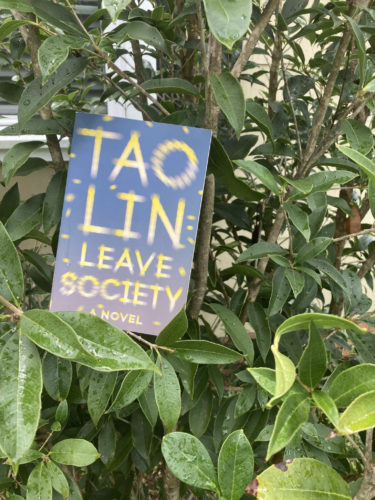
Tao Lin replaces John Cena as America’s tough guy with his new novel Leave Society. I say this referring to the cringe apology that Cena made to China in Mandarin for innocuously calling Taiwan a country. China considers Taiwan to be territory, not a separate country.
In Leave Society, the main character Li, based on Tao Lin, visits his parents in Taiwan. They refer to China as a separate country when his father must travel to China for business. The novel, also, is innocuous because it is Lin’s plain life. Yet, Li does not apologize or discuss Chinese relations with Taiwan. One might recall the phrase “walk softly but carry a big stick.”
Political awareness might be a part of life, but life carries on regardless of activism. One lives day to day, as Li does in his novel, not always out to make a political statement. That would not be art, but propaganda, no matter how many people say that all art is political. The only mention of politics occurs as he describes his parents’ bickering. They prefer opposing political parties in Taiwan and in the USA; even though, the parties do not have reciprocity on the conservative/liberal spectrum.
As the novel unfolds, one might choose to see political statements or activism. Maybe some might read it through the lens of not kowtowing to China: the absence of an apology being political. That, however, is not the point of Leave Society. A novel that pushes no particular political agenda refreshes American readers and appeals to readers across the globe. It might also stand the test of time in a way that Jami Attenberg’s—who once tweeted that she began a talk, saying that there were more than two genders—novels might not.
Li envisions a day in his life as being a page in a novel. He calculates the number of pages and days it would take to create a book. He thinks about how he might best fill those days to make a great life, but not necessarily how to make a great novel, no shade. Instead, it is his novel writing method. Li takes notes and writes-up notes. In an August 6, 2021 interview with Interview, Lin says, “Starting with Shoplifting from American Apparel, I stopped making up characters and scenes. The fictionalizing happens now when I choose what to include. If I had included everything that happened to me from 2014 to 2018, Leave Society would be around a million words probably, which is like 4,000 pages.”
This evolution differs from previous writing methods that Lin describes in an August 16, 2017 interview in The Creative Independent, “I agree that my novels except Eeeee Eee Eeee are explicitly autobiographical, but I still view them all as equally fictional because, to me, nonfiction doesn’t recreate dialogue, combine characters and scenes, or make up characters and scenes—things I’ve done in autobiographical fiction—but is strictly accurate, using verbatim dialogue and real names and specific dates.”
When I read Leave Society, it feels like memoir. Only instead of being first person, it is third person. The protagonist’s name seems similar to the author’s name, Li instead of Lin. We never know if Li is the first name or the last name. In Shoplifting from American Apparel, the protagonist is Sam, which is a first name and has three letters like Tao. I did not read Taipei, but the protagonist’s name is Paul. I cannot tell why Lin chose to make that his avatar.
Besides third person, the tension Lin creates in his novel differs from the tension a memoirist writes. The memoirist promises what the story is. When we read Lynne Cox’s Grayson, we want to know what it’s like swimming with a whale. I am eager to find out along with Dani Shapiro who her real father would be. Lin promises in a conversation between Li and Li’s mom about DMT, where she asks the benefits DMT gives a human, to include his answer in the last chapter of his novel.
At that point, I wanted to skip to the end to find the answer. I did. I turned to the last page, but I found mention of someone named Kay. This character does not appear in the first pages, so I stopped looking for the answer to DMT’s benefits to prevent spoiling the story. I tried to forget about Kay. Leave Society, however, develops not as a story of DMT but a story of life. The tension Tao Lin creates around DMT feels like the tension of an easter egg in a video came, like finding Yoshi on the top of the castle in Super Mario 64—we want to know, but we enjoy the fun without it. I dog-eared the initial promise to reveal the benefits of DMT, which proved helpful because I forgot the subject of the promise at the novel’s end. Lin forged the tension because I knew he made a promise, even though I couldn’t remember it exactly.
Tension exists around DMT because popular people experiment with it. For one, Mike Tyson experiments with DMT. He discusses with Joe Rogan how much love he felt when he tried it and how much of the love remains. Rogan agrees that it’s life changing. The rumors I’ve heard about it include users experiencing the same hallucination. They’re in a room, connected to other people. I envision a mix between the experimentation room in an alien spacecraft and the pod room in The Matrix. What stops me from trying is that no downside is discussed in media. We hear the downsides of alcohol and cigarettes. If one looks for it, you can find the downsides of marijuana. (Rudy Eugene ate a man’s face in Florida and toxicology reports show only marijuana in his system, not bath salts.) Also, I might be too old to try psychedelics for the first time.
Other rumors about DMT include the hormones being released are the ones that get released naturally at the time of death or during a near death experience. What if the body contains enough only for the transition between life and death? I’ve heard that you can only do DMT once, but others say they’ve done it multiple times. I worry that I might use up the hormone I need at the time of death. I don’t know the science of this, and I’ve never tried DMT, but these are worries I have. Consider this the lone statement of DMT’s downsides in popular culture.
My statement of DMT’s downsides does not spoil the easter egg Lin hides in the last chapter of Leave Society. Li’s mom asks to know the benefits of DMT. Her initial query comes in an email. Li promises to answer the question. The question is not, “What are the downsides of DMT?” In fact, as I stated previously, there is no evidence of widespread DMT downsides. Li’s mom seems to be tiptoeing around her own worry for Li because she knows that Li once experimented with hard drugs years before.
The relationship between Li and Li’s mom (Tao Lin and his mom) might be revealed in more detail in previous works, but in Leave Society, Li gives Li’s mom and Li’s dad advice on what medicines they should not take, statins mainly. He spends time telling them alternative remedies and how those are better. Li’s mom’s question about DMT might not be as much tiptoeing as it is their new way of relating. Sometimes, though, Li’s mom and Li’s dad experience relapses and take pharmaceuticals that doctors prescribe. Perhaps she worries that Li, too, relapses. Li does not relapse. This is not a drug experience novel, but big pharma gets the criticism it earns.
In criticizing big pharma, Tao Lin finds Leave Society already left. Browsing social media one notices how many people praise vaccine mandates and know the names of the different pharmaceutical companies that offer covid vaccines. Three years ago, people hated big pharma. Political candidates said on national stages that they would take on big pharma. Now, pharmaceutical companies are household names. Their propaganda worked.
Lin’s book subverts the current narrative. It does so in a natural way because it is nothing but a life lived one day and one page at a time. Some days everyone hates a bad thing, but today, the bad thing hasn’t changed, people have changed their minds. Three years ago, Lin’s novel would go with the flow, today it still does, only it appears it does not. It feels cool and natural, not reactive. Reactive novels exhaust the reader. When I read Tao Lin, I feel like I’m doing something cool for myself. Now, reading Leave Society, I feel punk rock.
By Robert McCready
